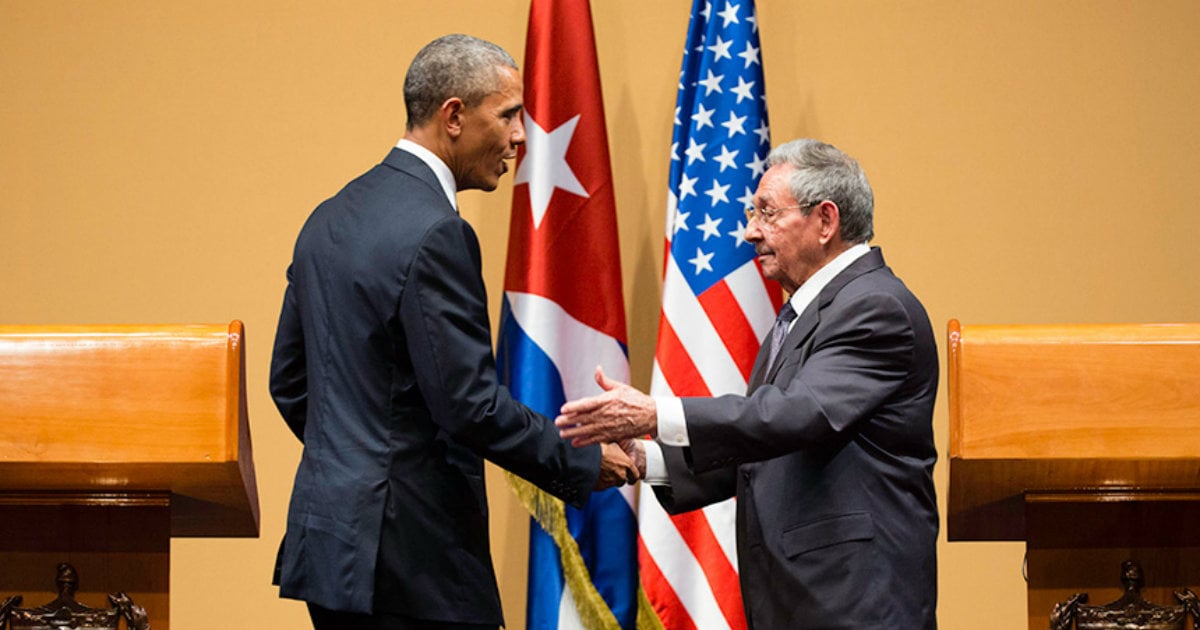
Related videos:
As the tenth anniversary of the beginning of the thaw in relations between the United States and Cuba approaches, announced by Raúl Castro and Barack Obama on December 17, 2014, the U.S. government has referred to this period as a "missed opportunity," criticizing the lack of significant progress in human rights and democratic reforms by the Cuban regime.
According to statements by U.S. Deputy Secretary of State Brian Nichols reported by Martí Noticias, despite the diplomatic efforts initiated in 2014 under the Obama administration, the Cuban government did not meet the expectations for change that were anticipated with the opening.
"The restoration of diplomatic relations under the Obama administration was an important step toward improving the lives of Cuban citizens and addressing challenges such as the lack of democracy on the island. However, the reforms we would have liked to see in Cuba did not occur," Nichols stated.
Instead of capitalizing on the economic and political opportunities presented by the normalization of relations, Havana continued with restrictive and repressive policies towards its population.
The thawing process, which included the reopening of embassies and an increase in the flow of tourists and remittances to the island, initially generated hopes for internal transformations.
In 2015, then-President Barack Obama cited the rapprochement with Cuba as one of the major achievements of his administration, highlighting the reopening of embassies and the easing of travel restrictions.
However, by 2016, it was evident that although some changes had occurred, the economic embargo and human rights violations on the island persisted.
The regime's lack of will to implement meaningful structural changes has kept Cuba in economic and social stagnation, exacerbated by the sanctions reimposed during Donald Trump's administration and maintained by Joe Biden.
During his first term, Trump implemented a series of measures that reversed much of the engagement promoted by the Obama administration. Among the most notable actions were the strengthening of the economic embargo, travel restrictions to Cuba, and limitations on the sending of remittances.
Furthermore, in January 2021, just before the end of his term, the Trump administration re-designated Cuba as a State Sponsor of Terrorism, imposing new sanctions and financial restrictions.
According to analysts, these measures aimed to pressure the Cuban government into implementing democratic reforms and improving the human rights situation on the island. However, they also contributed to the deterioration of the Cuban economy and the worsening of living conditions for its population.
"In 2021, we witnessed a wave of repression that truly shocked the world, marking a significant setback for the well-being of the Cuban people and the international community. It was a missed opportunity on the part of the Cuban regime," emphasized Nichols, who has served under the administration of Joe Biden, which has upheld the measures of its predecessor.
The U.S. reiterated that any future engagement with Cuba will depend on tangible progress in the release of political prisoners, respect for human rights, and the implementation of measures for democratic apertura.
For the moment, the bilateral relationship remains characterized by tensions and distrust, with a critical assessment a decade after the historic announcement.
Frequently Asked Questions about the Thaw between the United States and Cuba
Why does the United States consider the thaw in relations with Cuba a "missed opportunity"?
The United States views the thaw in relations with Cuba as a "lost opportunity" because, despite the diplomatic efforts initiated in 2014, the Cuban government did not meet expectations for change in human rights and democratic reforms. Even with the reopening of embassies and an increase in tourist traffic, the Cuban regime continued to implement restrictive and repressive policies.
How did Donald Trump's policies affect the relationship between the United States and Cuba?
Donald Trump's policies reversed much of the rapprochement promoted by the Obama administration. The economic embargo was strengthened, travel to Cuba was restricted, and remittances were limited. Additionally, Cuba was once again placed on the list of state sponsors of terrorism, which imposed new sanctions and financial restrictions.
What stance has the Joe Biden administration taken regarding policy towards Cuba?
The Joe Biden administration has largely upheld the measures imposed by the Trump administration regarding Cuba. Until the end of his term, Biden does not plan to alter his policy, including the designation of Cuba as a state sponsor of terrorism and the continuation of the economic embargo. However, some non-immigrant visas have been reactivated.
What impact would Donald Trump's potential return have on U.S. policy toward Cuba?
Donald Trump's potential return could signify an even harsher approach to policies towards Cuba. It is anticipated that Trump may fully reinstate economic and immigration restrictions, focusing on curbing illegal migration and limiting the influence of foreign powers such as China and Russia in Cuba.
Filed under: